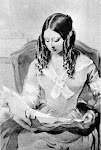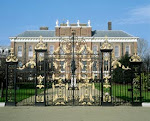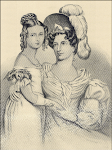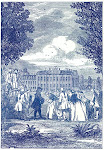

The pictures you are seeing are stills from a new movie that has not been released yet, called "The Young Queen." The pictures were in google search, and so I don't think this is a secret. If you're a royal watcher like I am, you may have known this, but if not...well, I'm telling you this is advance. Sometime in 2009, the movie will probably be released in movie theaters in the United States, and in England before that.
I knew about this while they were still filming, and also corresponded with an extra on the film. Not only that, I had the audacity to write to Julian Fellowes, and he was kind enough to reply! Emily Blunt looks lovely as Victoria--there is definitely a resemblance. Obviously, Emily is prettier. I've stared at this picture so much. Look at that hair.
Rupert Friend got the role of Prince Albert. He looks dashing. I've been very excited over this movie, and I simply can't wait to see it. I'm particularly excited that--- finally---someone is telling her story! And the story of her exciting young life, and her love affair with Albert. Sarah Ferguson has to be credited with this. She has always loved Queen Victoria and has researched her, and it is because of her--I believe-- that this finally came to the screen. The screenplay was written by FAMED Julian Fellowes---and Martin Scorsese is involved as well.
Oh, it's about time!!! I always knew there was a wonderful story here to be told. Her diaries and letters and her story fueled my imagination for years, and on many rainy days. I will often curl up with a book about their early marriage or their home life, or even one of their homes. Sometimes I'll curl up with some of her letters to her daughter Vicky and Vicky's replies to her mother.
I found the below story in the Guardian UK, and I want to share it with you. I didn't write it--it was written by David Smith, and he reveals Julian Fellowes feelings on the project. This should give you a feeling of the magnitude of this film and the excitement surrounding it. Here it is...
Revealed: the sad, lonely childhood of VictoriaOscar-winning screenwriter Julian Fellowes tells of his passion for the queen-to-be who slept in a cot
David Smith
Sunday
July 8, 2007
The Observer
Smothered by a neurotic mother, denied friendship and banned even from climbing stairs without adult supervision, her duty was to be seen and not heard. The child who endured this miserable fate? The future Queen Victoria, according to the author of a new biopic of Britain's longest reigning monarch.
Smothered by a neurotic mother, denied friendship and banned even from climbing stairs without adult supervision, her duty was to be seen and not heard. The child who endured this miserable fate? The future Queen Victoria, according to the author of a new biopic of Britain's longest reigning monarch.
Julian Fellowes, an Oscar winner for his screenplay of Gosford Park, spoke last week about his fascination with Victoria and how he intends to replace the image of her as an aloof, dowdy widow with that of a feisty, romantic teenager played by Emily Blunt, who made her name as Meryl Streep's highly strung assistant in The Devil Wears Prada.
The Young Victoria begins shooting in Britain next month and is produced by Graham King and Martin Scorsese, who won this year's best picture and best director Oscars respectively for their collaboration on The Departed.
The cast will include Miranda Richardson, who co-starred with 24-year-old Blunt in Gideon's Daughter, and Mark Strong, seen recently in the science fiction hit Sunshine, while the prize role of Prince Albert will be taken by Rupert Friend, who appeared in Pride and Prejudice and is dating its leading actress, Keira Knightley.
Set in the period from 1836 to 1840, the film starts with Victoria as a lonely, cossetted princess dominated by her mother and weighed down by her royal destiny. By the end, she has become Queen, her character has flowered and she is married to the love of her life, Albert.
Fellowes, whose long acting career included the television series Monarch of the Glen, has written the script after collaborating with Sarah, Duchess of York, who first pitched the idea and was well placed to help with historical research. He said it was a dream subject and admitted: 'I thought, if someone else writes this film I'll have to kill myself.'
Before her 63-year reign began, he said, Victoria had a 'horrible childhood'. Her father died before her first birthday, leaving her mother, the Duchess of Kent, to raise the sole heir to the throne.
'The duchess can never have another child who is in line to the throne because her husband is dead,' Fellowes said. 'She's just got this one frail little squib that will be Queen if only she doesn't die. This created in her a kind of neurotic protectionism, a smothering childhood where Victoria could not have her own room and had to sleep on a little cot next to her mother's bed until she was 18.
'She wasn't able to go up or down stairs without holding an adult hand. She had almost no friends. William IV, as the Duke of Clarence, and his wife, Queen Adelaide, wanted to see as much of her as they could, but her mother wouldn't allow it. It was a terribly lonely childhood.'
The death of William IV, however, changed everything. Victoria ascended to the throne and emerged from her mother's shadow. At the heart of the film is the love story of Victoria and Albert, the first cousin she married in 1840. This happy and fulfilled chapter of her life is largely forgotten today, Fellowes added. 'The Queen Victoria we know is the woman in black with the handkerchief on her head, depressed about being a widow. Very few people know about the girl and this is the other side of her that very few people know about: that she was young, that she loved dancing, that she loved music and that she was very romantic. She was madly in love; this wasn't an arranged marriage in that sense at all.' '
Fellowes said he admired Dame Judi Dench's portrayal of the older Victoria in the film Mrs Brown and he hopes Emily will capture the same essence. 'Judi Dench wasn't in the least cliched; I felt it was a very interesting, layered, sympathetic performance.'
Blunt told The Observer: 'I couldn't help but be attracted to this remarkable, high-spirited, feisty girl... she was a rebel. The script is exciting, as you see the public and private Victoria are very different, and you realise what a performance it was to be a Queen. I identify with her hugely as we all know what it is like to be teenage, to stubbornly think we know it all and to be in a job in which you feel you are way over your head, not to mention being deeply in love for the first time.'
The actress added: 'She had such zest for life at a young age, would talk with such passion about the people she loved, opera, food! She can't have been that repressed... she had nine kids!'
...I also found another article written by BAZ BAMIGBOYE -
Last updated at 08:13am on 21st September 2007
Title: BLUNT PRAISE FOR OUR SHARP YOUNG QUEEN
Emily Blunt has decided that her Queen Victoria won't be rigid and unsmiling - she'll be a wild child who, behind the scenes, lets her hair down.
Dashing actors Rupert Friend, as Prince Albert, and Paul Bettany, as Lord Melbourne, are the men vying (for different reasons) for the young Victoria's attention.
"She was a very feisty teenager, unreadable at times," Emily told me as we sat in her trailer during a break from shooting The Young Victoria on location at Arundel Castle.
"People couldn't place why she was so charismatic because she was this diminutive little thing, not particularly attractive, but there was so much power in her."
Emily was wearing a towelling robe over a corset.
A beautiful gown, one of 40 created for her by Oscar-winning designer Sandy Powell, was on a hanger to protect it while she was eating her lunch and chatting to me.
Screenwriter Julian Fellowes, another Oscar-winner (the production is littered with them, including make-up maestro Jenny Shircore and producers Graham King and Martin Scorsese) describes the film, which is six weeks into a two-and-a-half-month shooting schedule, as being about Victoria's "self-empowerment".
"It's her human struggle, her refusal to be manipulated when everyone was trying to pull her this way and that," Fellowes told me.
The film charts her perilous journey to the throne. Her own mother, the Duchess of Kent, in league with Sir John Conroy, controller of her household, tried to get power over Victoria - and the country - by being named Regent. But as we know, William IV thwarted that little plot by clinging on to power till his niece was 18.
One scene I watched involved Jim Broadbent, as the old King, hurling insults at Miranda Richardson's Duchess during a banquet.
And that's just on the domestic scene! Abroad, her uncle, King Leopold of Belgium, used Victoria and his nephew Prince Albert as pieces on a chess board.
Albert is played by the fast-rising Rupert Friend, who made his mark in Pride And Prejudice and Mrs Palfrey At The Claremont.
What everyone overlooked in Victoria and Albert's arranged marriage, Fellowes explained, "was the possibility that they would fall in love.
"We know from her diary that to be engaged to Albert, she wrote, 'would make me happy, too happy'."
Albert was the shy Teutonic prince, while she was more extrovert.
Even on their wedding night, according to the film, Victoria took the lead.
The scene has the newlyweds sitting on a bed as Albert gently takes her hand.
"Just love me. Now," she says, kissing him.
The screenplay guidance then observes: "This side of things at least will clearly not be a problem."
How do we know what went on in the royal bed, I asked Fellowes.
"We don't know anything about their wedding night," he agreed, adding with a laugh, "except it was a great success."
Although theirs was a great passion, there were also some right royal rows.
Emily, who starred in My Summer Of Love and as Meryl Streep's assistant in The Devil Wears Prada, explained that Victoria noted the arguments in her own diaries.
"There are references in her diaries to her screams reverberating around the castle and her slamming doors.
"Albert would just walk away and she would follow him from room to room.
"The way she writes in her diaries is very evocative. A lot of words were italicised and some underlined four times.
"Victoria, who at this point had been controlled her whole life, felt Albert was her freedom."
Emily clearly relished Victoria's human side.
"We tend to view that period with a bit too much reverence and I think it can become very stuffy."
That's why producers King and Scorsese (the duo behind Oscar-winning film The Departed) went after French-Canadian film-maker Jean-Marc Vallee to direct the film.
Vallee, who made C.R.A.Z.Y., was enough of an outsider to see the young Victoria as a rebellious teenager.
"She was growing up and learning how to be Queen and be responsible," Vallee explained.
And so, if you're getting interested, I give you permission to get excited. I'll keep you filled in before the movie comes out so that you'll have an idea of her personality and what she went through as she became Queen and met Albert. And surely, they will do a sequel, won't they? Well...if not, I will.

















